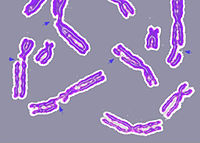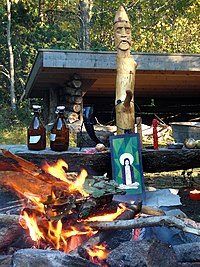
Restoration of ligatable "clean" double-strand break ends is the rate-limiting step in the rejoining of ionizing-radiation-induced DNA breakage.
Sign Up to like & getrecommendations! Published in 2020 at "DNA repair"
DOI: 10.1016/j.dnarep.2020.102913
Abstract: Radiotherapy kills malignant cells by generating double-strand breaks (DSBs). Ionizing- radiation (IR) generates "dirty" DSBs, which associates with blocking chemical adducts at DSB ends. Homologous-directed repair (HDR) efficiently removes IR-induced blocking adducts from both 3'… read more here.
Keywords: limiting step; dsbs; rate limiting; restoration ... See more keywords

SLX4 Prevents GEN1-Dependent DSBs During DNA Replication Arrest Under Pathological Conditions in Human Cells
Sign Up to like & getrecommendations! Published in 2017 at "Scientific Reports"
DOI: 10.1038/srep44464
Abstract: SLX4 is a versatile protein serving as docking for multiple structure-specific endonucleases during DNA repair, however, little is known about its function at demised replication forks. Using RNAi or FA-P cells complemented with SLX4 mutants… read more here.
Keywords: dna; gen1 dependent; dsbs; slx4 prevents ... See more keywords

R-loop-induced irreparable DNA damage evades checkpoint detection in the C. elegans germline
Sign Up to like & getrecommendations! Published in 2022 at "Nucleic Acids Research"
DOI: 10.1093/nar/gkac621
Abstract: Abstract Accumulation of DNA–RNA hybrids in the form of R-loops can result in replication–transcription conflict that leads to the formation of DNA double strand breaks (DSBs). Using null mutants for the two Caenorhabditis elegans genes… read more here.
Keywords: loop; damage; dna damage; dsbs ... See more keywords

A shared ‘vulnerability code’ underpins varying sources of DNA damage throughout paternal germline transmission in mouse
Sign Up to like & getrecommendations! Published in 2023 at "Nucleic Acids Research"
DOI: 10.1093/nar/gkad089
Abstract: Abstract During mammalian spermatogenesis, the paternal genome is extensively remodelled via replacement of histones with protamines forming the highly compact mature sperm nucleus. Compaction occurs in post-meiotic spermatids and is accompanied by extensive double strand… read more here.
Keywords: spermatid dsbs; damage; dna damage; dsbs ... See more keywords

Phosphoregulation of DSB-1 mediates control of meiotic double-strand break activity
Sign Up to like & getrecommendations! Published in 2022 at "eLife"
DOI: 10.1101/2022.02.16.480793
Abstract: In the first meiotic cell division, proper segregation of chromosomes in most organisms depends on chiasmata, exchanges of continuity between homologous chromosomes that originate from the repair of programmed double-strand breaks (DSBs) catalyzed by the… read more here.
Keywords: dsb; dsbs; double strand; phosphoregulation dsb ... See more keywords

Genes Possessing the Most Frequent DNA DSBs Are Highly Associated with Development and Cancers, and Essentially Overlap with the rDNA-Contacting Genes
Sign Up to like & getrecommendations! Published in 2022 at "International Journal of Molecular Sciences"
DOI: 10.3390/ijms23137201
Abstract: Double-strand DNA breakes (DSBs) are the most deleterious and widespread examples of DNA damage. They inevitably originate from endogenous mechanisms in the course of transcription, replication, and recombination, as well as from different exogenous factors.… read more here.
Keywords: highly associated; dna; rdna contacting; dsbs ... See more keywords

An Adaptive Role for DNA Double-Strand Breaks in Hippocampus-Dependent Learning and Memory
Sign Up to like & getrecommendations! Published in 2022 at "International Journal of Molecular Sciences"
DOI: 10.3390/ijms23158352
Abstract: DNA double-strand breaks (DSBs), classified as the most harmful type of DNA damage based on the complexity of repair, lead to apoptosis or tumorigenesis. In aging, DNA damage increases and DNA repair decreases. This is… read more here.
Keywords: dsbs; adaptive role; learning memory; repair ... See more keywords